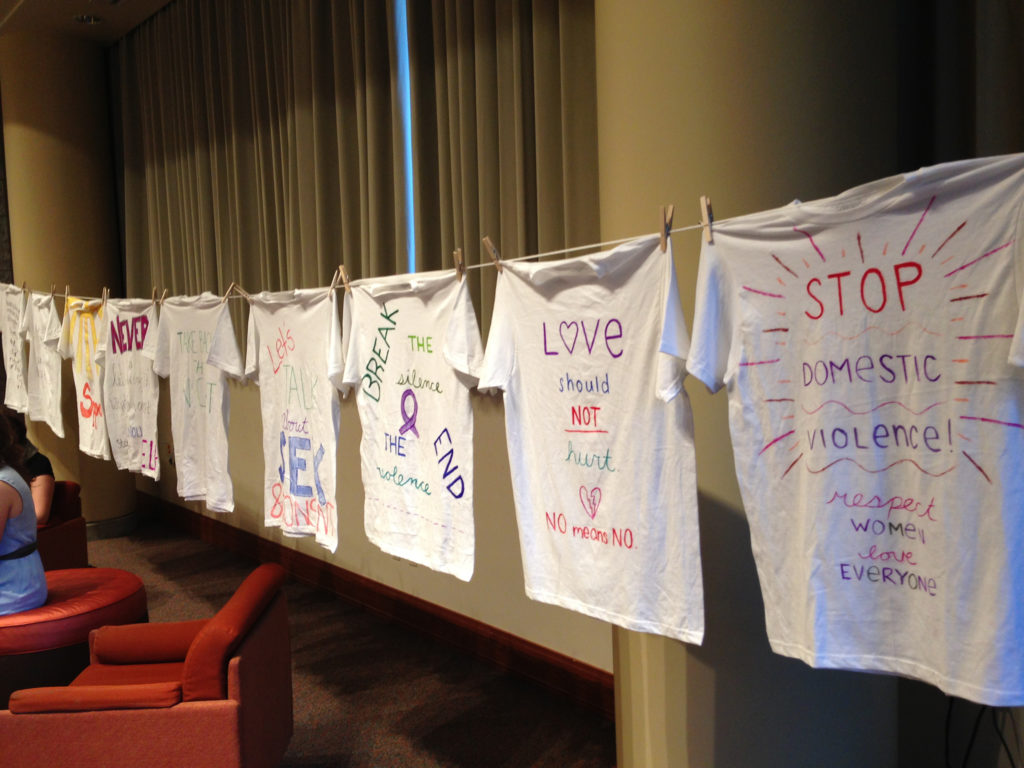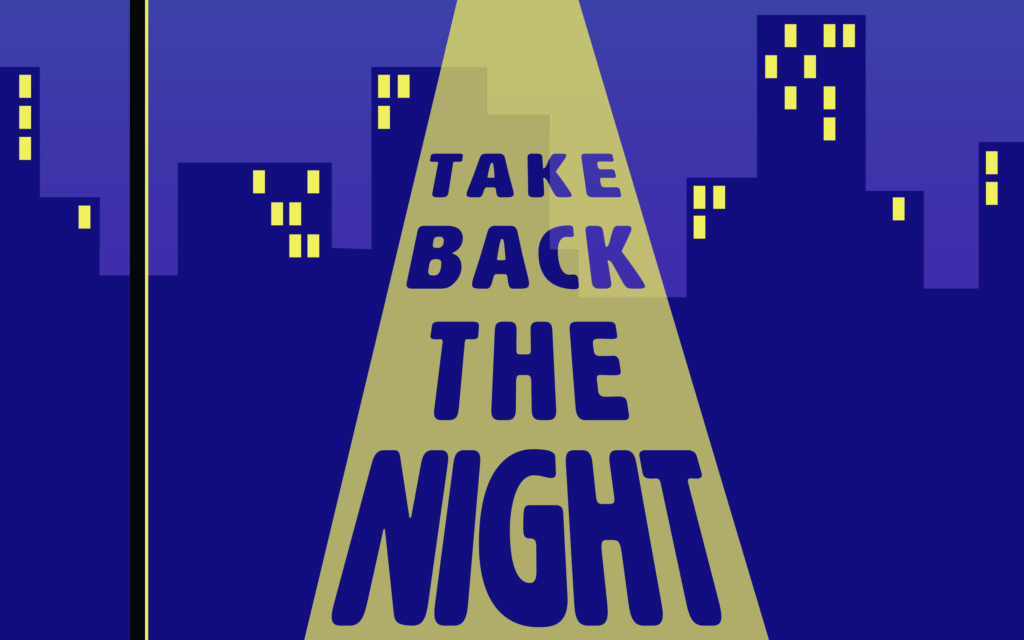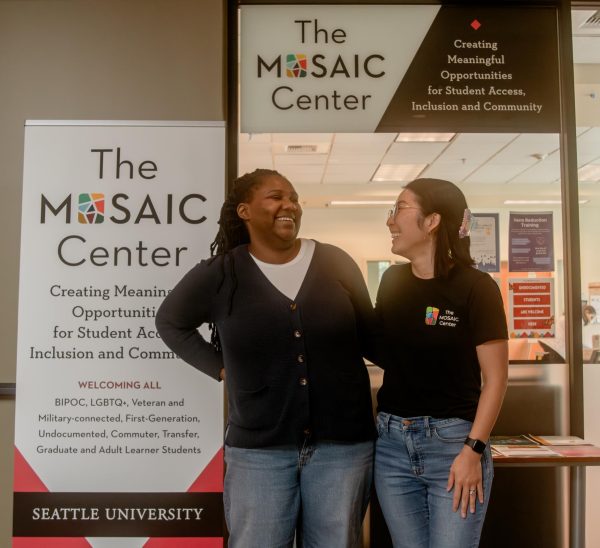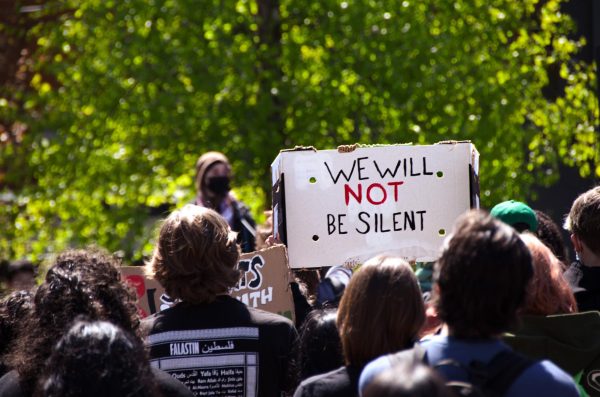Take Back the Night: Campus Events Promote Sexual Assault Awareness Month
Take Back the Night (TBTN) has been an annual event at Seattle University every April, and this year continued to be a supportive space for survivors of sexual assault. Along with TBTN, Health and Wellness Crew (HAWC) hosted two educational events last week: The Clothesline Project and a student conversation about masculinity.
Izzy Wroblewski, program coordinator for healthy relationships at HAWC and an advisor for TBTN, spoke to the mission and significance of the event.
“The intention of Take Back the Night is to really give a space to support those who’ve experienced trauma, and survivors, and to give an opportunity to take part in that support,” Wroblewski said. “By having the march, the vigil, the speakerss, and the speak-out, it gives students different opportunities to engage with the subject and to start a conversation about how sexual violence or different types of personal power-based relationship can really affect our community.”

A clothesline hung with T-Shirts with various phrases written on them made by survivors of sexual assault.
April is Sexual Assault Awareness Month, and Seattle U’s theme for this year is “I ask for consent.”
Wroblewski believes that education on consent is important in creating more awareness for and in changing the stigma surrounding sexual assault.
“I think it all starts with talking about these issues, starting consent education really early in elementary schools and middle schools, incorporating consent into everything we do or we think about, and really working to end power-based personal violence with bystander intervention,” Wroblewski said. “If you see something, say something. And when someone does come to you saying, ‘Hey, this happened to me,’ believe that person, support that person, tell them it’s not their fault that it happened to them.”
Jesse Goncalves, a senior math major and coordinator of the student conversation on masculinity, discussed the perceived differences between masculinity and femininity.
“I think that because masculine and feminine are these ideas, they’re not people or characteristics that everyone has. But they’re ideas that often influence us as expectations of how we are supposed to be based on whatever gender we’re perceived to have or we identify with,” Goncalves said. “I think that particularly men often have a really hard time identifying expectations or experiences as being influenced by masculinity because we often have the privilege not to be aware of that, or not to talk about it.
Goncalves advises to reflect on what masculinity is and to bring that awareness into everyday life to “consider how we can escape the box it puts us in.”
The perception of masculinity could be changed through reflecting on and becoming more aware of how masculinity affects everyone and is the first step in seeing how people are boxed into gender expectations.
“Being able to see that box and see those expectations and how they play out for us is the first step for understanding which expectations we want to challenge, which expectations we want to embrace, and the spectrum between those two things: which expectations we want to work through and change for ourselves,” Goncalves said.
“Every girl hears that statistic that in college, one in five women will be raped. And I remember being a sophomore in high school and standing with my friends… and I realized there were five of us there. And I was devastated to see that.”
Zac Galvan, a graduate student at Seattle U and the program coordinator at HAWC, also discussed the ideas of masculinity. Galvan believes that masculinity is rooted in social perceptions rather than biology, and can create challenges in forming healthy relationships with people and communities.
“Certain aspects of masculinity restrict men and how they can express themselves,” Galvan said. “That can really impact the way that they treat other people, whether that be resorting to anger as a response to trauma or resorting to keeping traumatic emption pent up until it results in self-harm or worse. So I think that masculinity, or certain aspects of masculinity as it’s become, poses a lot of threats, not just to men, but to non-male-identified people.”
Even though sexual assault is not a new problem, it is never too outdated to be discussed. Walking through The Clothesline Project wall, participants could have a brief look at a part of the problem—why it would be so important to fight against sexual assault and why the problem was traumatic, both of the questions were answered with The Clothesline Project wall. Joining in the masculinity conversation gave participants an opportunity to think carefully about the gender perceptions and what we should do to change that issue. Throughout TBTN, the masculinity conversation, and The Clothesline Project, HAWC wanted to give students of any gender an opportunity to consolidate and share how they think about domestic violence and sexual assault.
Catherine Schultz, a sophomore communication and media major and a member of the HAWC team, believes that HAWC is a good support resource for Seattle U students.
“Being a listener is a lot of what HAWC does,” Schultz said. “I think that there is so much strength and power in someone sharing their story, and that is why we create a space like this, to give survivors a platform to share their stories. But everyone has their own journey and process through healing, so sharing it in a public setting like this might not be beneficial to someone like it is to someone else. So we try to provide a lot of different kinds of resources for everyone in their vast experiences.”
Alex McGrew, a sophomore creative writing major and a volunteer at HAWC, spoke to her own personal experience of becoming particularly troubled with sexual assault.
“Every girl hears the statistic that in college, one in five women will be raped. And I remember being a sophomore in high school and standing with my friends… and I realized there were five of us there. And I was just devastated to see that,” McGrew said. “It’s different hearing that versus seeing five women standing there and realizing it could happen to one of us, it could happen to all of us. And so the vigil is a really good representation of the fact that everyone knows someone. I don’t know if the statistic has changed or not, but it’s something that we hear about so often that it’s really easy to forget how many people it’s directly impacting.”
The problem of sexual assault and rape culture can be changed if sex and gender education started earlier in schools.
McGrew’s colleague, Katie Anderson, a sophomore psychology and interdisciplinary double major, emphasized the importance of education and how it is a necessary step in preventing sexual assault in the future.
“At least my own experiences, in high school, consent was never talked about, there was no type of sex-ed—it was a Catholic high school—but that doesn’t mean we can’t talk about sex. I just saw that a lot of people around me not understand what consent is,” Anderson said.
Anderson believes that having even the most basic introduction to consent, for both sexual and non- sexual acts, will help in respecting others’ boundaries and what people want for themselves. This could lead to normalizing concepts similar to this.
“Just further talking about it in the education system so that when we get older and get to places like college, people know about these things, and it will inevitably lessen these types of situations and lessen the amount of trauma that people have to experience if people are coming into educational spaces like this with the knowledge,” Anderson said.
McGrew also agreed that sex education should start as soon as possible.
“And it’s not even just a private school thing. I went to public school up until I got to college and my first sex-ed class was in seventh grade, and no one talked about consent,” McGrew said. “So it really wasn’t until I started doing my own research and asking really awkward questions to my parents, because the sex-ed I was getting at my school was so lacking, that I started to learn about consent.”
At the end of the day, TBTN, masculinity conversation, and The Clothesline Project wall has contributed to the Sexual Assault Awareness month. It is an opportunity for the Seattle U community to take a look at the problem and do whatever they can to change it.
The editor may be reached at
[email protected]












